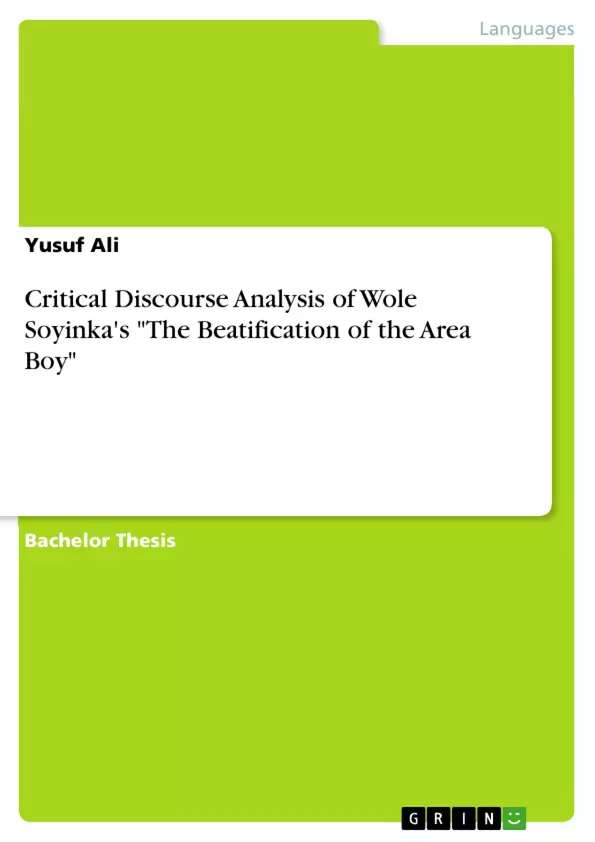This project is a Critical Discourse Analysis of Wole Soyinka’s "The Beatification of the Area Boy". Norman Fairclough’s theory has been used in the analysis of the text so as to reveal the hidden meaning behind every social interaction and how they affect power relation in the society. It is aimed at revealing the deep meaning of interactions as they affect our daily lives.
The methodology for the research is through selection and consequent analysis of utterances and other social behavior in the text. This will reveal the socio-cultural and the political atmosphere in the text. The textual, political and socio-cultural analysis have revealed the imbalances in the use of language among different strata of the society. Also, how the use of language reflects power dominance, injustice and inequality.
Inhaltsverzeichnis (Table of Contents)
- Introduction
- Literature Review
- Discourse Analysis
- Critical Discourse Analysis
- Wole Soyinka and His Works
- The Beatification of Area Boy
- Methodology
- Data Analysis
- Area Boys as "Other"
- Area Boys as Agents of Chaos
- Language of Power and Resistance
- The "Beatification" of Area Boys
- Conclusion
- References
Zielsetzung und Themenschwerpunkte (Objectives and Key Themes)
This project aims to conduct a critical discourse analysis of Wole Soyinka's play, "The Beatification of Area Boy," exploring the linguistic and ideological dimensions of power and resistance within the context of Nigerian society. It examines how language is used to construct, maintain, and challenge social hierarchies and power dynamics, particularly concerning the representation of marginalized groups.
- Power dynamics and social hierarchies in Nigerian society
- The representation of marginalized groups, specifically "Area Boys"
- The use of language as a tool for social control and resistance
- The ideological implications of linguistic choices and practices
- The concept of "beatification" in relation to social change and identity
Zusammenfassung der Kapitel (Chapter Summaries)
- Introduction: This chapter provides an overview of the project's objectives, research questions, and the theoretical framework employed. It introduces the context of the study, including the relevance of critical discourse analysis to understanding power structures in Nigerian society.
- Literature Review: This chapter reviews existing literature on discourse analysis, critical discourse analysis, Wole Soyinka's works, and the sociopolitical context of "The Beatification of Area Boy." It establishes the theoretical foundation for the project.
- Methodology: This chapter details the research methodology employed in the project, including the data collection and analysis methods used to examine the play's language and its ideological underpinnings.
- Data Analysis: This chapter presents a detailed analysis of the play, exploring key themes and linguistic features related to power dynamics, representation of "Area Boys," and the interplay between language and resistance.
Schlüsselwörter (Keywords)
Key keywords and focus topics of this project include critical discourse analysis, Wole Soyinka, "The Beatification of Area Boy," power dynamics, social hierarchies, marginalized groups, representation, language, resistance, ideology, and "beatification" in the context of social change and identity.
- Citar trabajo
- Yusuf Ali (Autor), 2016, Critical Discourse Analysis of Wole Soyinka's "The Beatification of the Area Boy", Múnich, GRIN Verlag, https://www.grin.com/document/339945



